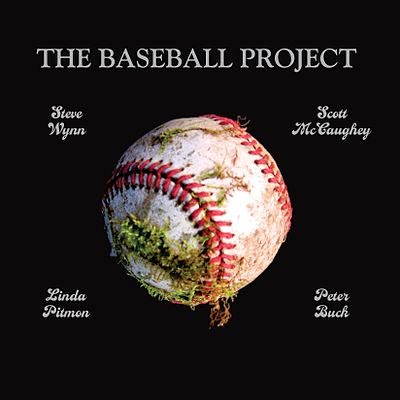Frozen Ropes and Dying Quails
I was listening to the NPR show "Only a Game" and heard about The Baseball Project, a collection of musicians from bands such as REM, The Young Fresh Fellows, and Dream Syndicate, and how they've put out two albums of songs that are exclusively about baseball. Of course I had to sample their ware, and I started with Volume 1: Frozen Ropes and Dying Quails.
The relationship between rock music and baseball is a slender and fragile one. Of course there's John Fogerty's "Centerfield," but when he was honored by the Hall of Fame some years ago I couldn't help but think that the assembled players wondered who this scruffy guy was. Baseball at its heart is conservative, clinging to tradition, while rock music is progressive and experimental. But rock musicians, just like the rest of us, are not immune to the charms of baseball and its lore.
The songs are written by Scott McCaughey and Steve Wynn, and the subjects range from the early retirement of Sandy Koufax to the louche ways of Black Jack McDowell. There's a song completely in Spanish about Fernando Valenzuela, and another about the legacy of Curt Flood, who challenged the reserve clause, ruined his career, yet paved the way for the riches of players today. This song is called "Gratitude," and has Flood singing from the beyond in a most sarcastic way.
Another song is "The Death of Big Ed Delahanty," a turn of the century player who mysteriously fell off a train bridge. The song is a raucous ballad:
"The night watchman said he'd seen a man
Ended up wearing his bowler hat
He heard a splash but he didn't see him fall.
For a week no one found a clue of him.
What good's it do to question death when it makes a bad call?
But I don't think he killed himself.
I think some strange notion drew him to Niagara Falls
Across the curve of day and night
Like the perfect arch of a high fly ball."
My favorite song on this record is "Harvey Haddix," about the luckless Pittsburgh Pirate pitcher who pitched nine-innings of perfect ball, but there was no score, so the game went into extra innings. He ended up pitching 12 perfect innings, but lost the game in the 13th, therefore he is not considered among the pitchers who have hurled perfect games. When the song was written, there were 17 such pitchers, and the lyric manages to get them all in there. Now there are 23 pitchers who have done the deed, and that doesn't include Armando Galaragga, who got screwed out of one by a bad call from an umpire. Perhaps there's a song in that.
The relationship between rock music and baseball is a slender and fragile one. Of course there's John Fogerty's "Centerfield," but when he was honored by the Hall of Fame some years ago I couldn't help but think that the assembled players wondered who this scruffy guy was. Baseball at its heart is conservative, clinging to tradition, while rock music is progressive and experimental. But rock musicians, just like the rest of us, are not immune to the charms of baseball and its lore.
The songs are written by Scott McCaughey and Steve Wynn, and the subjects range from the early retirement of Sandy Koufax to the louche ways of Black Jack McDowell. There's a song completely in Spanish about Fernando Valenzuela, and another about the legacy of Curt Flood, who challenged the reserve clause, ruined his career, yet paved the way for the riches of players today. This song is called "Gratitude," and has Flood singing from the beyond in a most sarcastic way.
Another song is "The Death of Big Ed Delahanty," a turn of the century player who mysteriously fell off a train bridge. The song is a raucous ballad:
"The night watchman said he'd seen a man
Ended up wearing his bowler hat
He heard a splash but he didn't see him fall.
For a week no one found a clue of him.
What good's it do to question death when it makes a bad call?
But I don't think he killed himself.
I think some strange notion drew him to Niagara Falls
Across the curve of day and night
Like the perfect arch of a high fly ball."
My favorite song on this record is "Harvey Haddix," about the luckless Pittsburgh Pirate pitcher who pitched nine-innings of perfect ball, but there was no score, so the game went into extra innings. He ended up pitching 12 perfect innings, but lost the game in the 13th, therefore he is not considered among the pitchers who have hurled perfect games. When the song was written, there were 17 such pitchers, and the lyric manages to get them all in there. Now there are 23 pitchers who have done the deed, and that doesn't include Armando Galaragga, who got screwed out of one by a bad call from an umpire. Perhaps there's a song in that.



Comments
Post a Comment